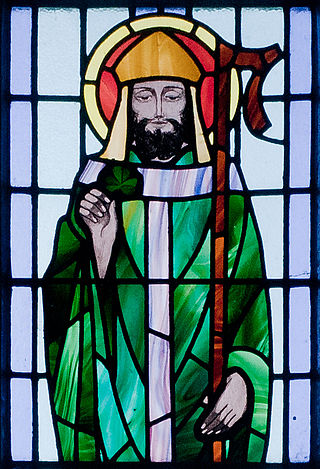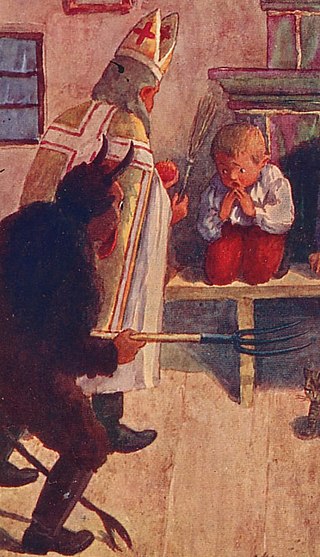Related Research Articles

Folklore is shared by a particular group of people; it encompasses the traditions common to that culture, subculture or group. This includes tales, myths, legends, proverbs, poems, jokes and other oral traditions. They include material culture, ranging from traditional building styles common to the group. Folklore also includes customary lore, taking actions for folk beliefs, the forms and rituals of celebrations such as Christmas and weddings, folk dances and initiation rites. Each one of these, either singly or in combination, is considered a folklore artifact or traditional cultural expression. Just as essential as the form, folklore also encompasses the transmission of these artifacts from one region to another or from one generation to the next. Folklore is not something one can typically gain in a formal school curriculum or study in the fine arts. Instead, these traditions are passed along informally from one individual to another either through verbal instruction or demonstration. The academic study of folklore is called folklore studies or folkloristics, and it can be explored at undergraduate, graduate and Ph.D. levels.

Halloween or Hallowe'en is a celebration observed in many countries on 31 October, the eve of the Western Christian feast of All Saints' Day. It begins the observance of Allhallowtide, the time in the liturgical year dedicated to remembering the dead, including saints (hallows), martyrs, and all the faithful departed.

Halloween costumes are costumes worn on Halloween, a festival which falls on October 31. An early reference to wearing costumes at Halloween comes from Scotland in 1585, but they may pre-date this. There are many references to the custom during the 18th and 19th centuries in the Celtic countries of Scotland, Ireland, Mann and Wales. It has been suggested that the custom comes from the Celtic festivals of Samhain and Calan Gaeaf, or from the practise of "souling" during the Christian observance of Allhallowtide. The Christian tradition of acknowledging the danse macabre is also suggested as the origin of dressing up on Halloween Dressing up is not strictly restricted to Halloween among Christians, with similar practices being observed on holidays like Christmas. Halloween costumes are traditionally based on frightening supernatural or folkloric beings. However, by the 1930s costumes based on characters in mass media such as film, literature, and radio were popular. Halloween costumes have tended to be worn mainly by young people, but since the mid-20th century they have been increasingly worn by adults also.

Saint Patrick's Day, or the Feast of Saint Patrick, is a cultural and religious celebration held on 17 March, the traditional death date of Saint Patrick, the foremost patron saint of Ireland.

A jack-o'-lantern is a carved lantern, most commonly made from a pumpkin or a root vegetable such as a rutabaga or turnip. Jack-o'-lanterns are associated with the Halloween holiday. Its name comes from the reported phenomenon of strange lights flickering over peat bogs, called will-o'-the-wisps or jack-o'-lanterns. The name is also tied to the Irish legend of Stingy Jack, a drunkard who bargains with Satan and is doomed to roam the Earth with only a hollowed turnip to light his way.

Guy Fawkes Night, also known as Guy Fawkes Day, Bonfire Night and Fireworks Night, is an annual commemoration observed on 5 November, primarily in Great Britain, involving bonfires and fireworks displays. Its history begins with the events of 5 November 1605 O.S., when Guy Fawkes, a member of the Gunpowder Plot, was arrested while guarding explosives the plotters had placed beneath the House of Lords. The Catholic plotters had intended to assassinate Protestant king James I and his parliament. Celebrating that the king had survived, people lit bonfires around London; and months later, the Observance of 5th November Act mandated an annual public day of thanksgiving for the plot's failure.

Folk art covers all forms of visual art made in the context of folk culture. Definitions vary, but generally the objects have practical utility of some kind, rather than being exclusively decorative. The makers of folk art are typically trained within a popular tradition, rather than in the fine art tradition of the culture. There is often overlap, or contested ground with 'naive art'. "Folk art" is not used in regard to traditional societies where ethnographic art continue to be made.

Kupala Night, also called Ivanа Kupala, is a traditional Slavic holiday that was originally celebrated on the shortest night of the year, which is on 21-22 or 23-24 of June and in Eastern Slavic countries according to traditional Julian calendar on the night between 6 to 7 July. Calendar-wise, it is opposite to the winter holiday Koliada. The celebration relates to the summer solstice when nights are the shortest and includes a number of Slavic rituals. It involves herb collecting, bonfire lighting, and bathing in the river.
The Folklore Society (FLS) is a national association in the United Kingdom for the study of folklore.
This is a bibliography of works about Halloween or in which Halloween is a prominent theme.

The University Libraries function as the academic library system for Bowling Green State University, and its regional campuses.
Francis "Buddy" Powers is an American former ice hockey player, coach and scout. He was the head coach for Bowling Green as well as Ice Arena Director for the Slater Family Ice Arena and color commentator for Bowling Green on The Buckeye Cable Sports Network.

Halloween is a celebration observed on October 31, the day before the feast of All Hallows, also known as Hallowmas or All Saint's Day. The celebrations and observances of this day occur primarily in regions of the Western world, albeit with some traditions varying significantly between geographical areas.

Bowling Green State University College of Arts and Sciences is the College of Arts and Sciences at Bowling Green State University in Bowling Green, Ohio. The college offers curriculum for both undergraduate and graduate students.
Ray Broadus Browne, was an American educator, author, and founder of the academic study of popular culture in the United States. He was Distinguished Professor Emeritus at Bowling Green State University (BGSU) in Bowling Green, Ohio. He founded the first academic Department of Popular Culture at BGSU in 1972, and is the founding editor of the Journal of Popular Culture, the Journal of American Culture, and the Popular Press. He also founded the Library for Popular Culture Studies (BPCL) at BGSU, the Popular Culture Association, and the American Culture Association. His particular area of specialization was American popular literature, and he was an authority on Herman Melville, Mark Twain, the popular culture surrounding Abraham Lincoln and the American Civil War, and the influence of Shakespeare on American popular music.

Krampus is a horned, anthropomorphic figure in the Central and Eastern Alpine folklore of Europe who, during the Advent season, scares children who have misbehaved. Assisting Saint Nicholas, or Santa Claus, the pair visit children on the night of 6 December, with Saint Nicholas rewarding the well-behaved children with gifts such as oranges, dried fruit, walnuts and chocolate, while the badly behaved ones only receive punishment from Krampus with birch rods. Krampus day itself, on the other hand, is on the 5th of December.
Bowling Green State University Department of Popular Culture is the first Popular Culture department in the United States. The department was founded by Professor Ray Browne in 1973. The Popular Culture department is unique as it is the only one in the US to offer both Bachelor's degrees and Master's degrees in Popular Culture.
Canadian folklore is the traditional material that Canadians pass down from generation to generation, either as oral literature or "by custom or practice". It includes songs, legends, jokes, rhymes, proverbs, weather lore, superstitions, and practices such as traditional food-making and craft-making. The largest bodies of folklore in Canada belong to the aboriginal and French-Canadian cultures. English-Canadian folklore and the folklore of recent immigrant groups have added to the country's folk.
Family folklore is the branch of folkloristics concerned with the study and use of folklore and traditional culture transmitted within an individual family group. This includes craft goods produced by family members or memorabilia that have been saved as reminders of family events. It includes family photos, photo albums, along with bundles of other pages held for posterity such as certificates, letters, journals, notes, and shopping lists. Family sayings and stories which recount true events are retold as a means of maintaining a common family identity. Family customs are performed, modified, sometimes forgotten, created or resurrected with great frequency. Each time the result is to define and solidify the perception of the family as unique.
The phrase English festivals cover a number of festivals which are Christian and secular that are traditionally celebrated in England. Most festivals are observed throughout England but some, such as Oak Apple Day, Souling, Rushbearing, Bawming the Thorn, and Hocktide are local to certain regions.
References
- ↑ "Jack Santino - Popular Culture - BGSU". Bgsu.edu. 2013-01-07. Archived from the original on 2013-12-07. Retrieved 2014-03-30.
- ↑ "Miles of Smiles - About Film". Paul Wagner Films. Retrieved 30 March 2014.
- 1 2 "About the American Folklore Society: AFS Leadership". The American Folklore Society. Archived from the original on 7 October 2010.
- ↑ Santino, Jack (1978). "The outlaw emotions : workers' narratives from three contemporary occupations". University of Pennsylvania. OCLC 7285613.
{{cite journal}}: Cite journal requires|journal=(help) - ↑ Santino, Jack. "Results for 'Jack Santino' > 'Jack Santino' > 'Book'". Worldcat.org. Retrieved 2014-03-30.
- ↑ Reviewed in Oral History Review 1990 18(2):157-160
- ↑ Reviewed by Daniel Wojcik, Western Folklore, Vol. 58, No. 1 (Winter, 1999), pp. 93–96, Western States Folklore Society